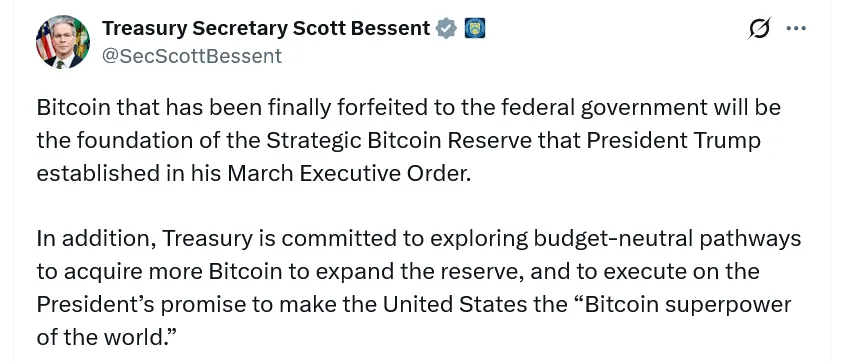US Treasury Clarifies Strategic Bitcoin Reserve Plans After Market Jitters
-

August 14, 2025 — U.S. Treasury Secretary Scott Bessent has clarified that the department is still exploring budget-neutral ways to buy Bitcoin for the Strategic Bitcoin Reserve, pushing back against earlier remarks that sparked a sharp sell-off.
In an X post Thursday, Bessent wrote:
“Treasury is committed to exploring budget-neutral pathways to acquire more Bitcoin to expand the reserve, and to execute on the President’s promise to make the United States the ‘Bitcoin superpower of the world.’”
He reiterated that Bitcoin forfeited to the federal government would form the reserve’s foundation.
Earlier Remarks Triggered Sell-Off
Roughly seven hours before his clarification, Bessent told FOX Business:
“We’re not going to be buying [Bitcoin], but we are going to use confiscated assets and continue to build that up.”
The comment was widely interpreted as an end to purchasing plans, wiping $55 billion from Bitcoin’s market cap in under 40 minutes. Prices slid from $121,073 to $118,886, according to CoinGecko. Despite the clarification, Bitcoin was trading at $118,500 at press time.
Slow Progress, Growing Frustration
The U.S. Strategic Bitcoin Reserve was created under a March 6 executive order from President Trump, alongside a Digital Asset Stockpile. Both are initially funded with crypto forfeited in criminal cases.
The order allows “budget-neutral” purchases — strategies that don’t add costs to taxpayers — but the Treasury has yet to announce concrete steps. Options floated include re-evaluating gold certificates and allocating tariff revenue.
Some Bitcoin advocates say the slow pace risks the U.S. being front-run by other nation-states. Braiins CEO Eli Nagar criticized the lack of movement:
“At some point, exploration without execution starts to look like avoidance. Come on, get moving!”
El Salvador Bitcoin adviser Max Keiser also mocked Bessent’s repeated use of the word “exploring.”
Legal Hurdles and Legislative Push
One obstacle is that congressional approval may be required for budget-neutral Bitcoin purchases. Senator Cynthia Lummis has urged lawmakers to consider the BITCOIN Act, introduced in March, to formalize such acquisitions.
No Selling Planned
While buying plans remain uncertain, Bessent confirmed that the U.S. will stop selling its Bitcoin holdings, which he estimated at $15–$20 billion in value.
Blockchain tracker BitBo lists 198,012 BTC in U.S. possession, worth about $23.5 billion at current prices.
This incident shows just how sensitive Bitcoin markets remain to policy signals from Washington — and how the Strategic Bitcoin Reserve debate is quickly becoming a geopolitical and legislative race.
-
This episode shows how fragile the Bitcoin market still is when it comes to government signals. One offhand remark from Bessent erased $55B in market cap within 40 minutes — and even after the “clarification,” BTC couldn’t bounce back immediately. That tells us two things:
Policy credibility is now a key market driver, almost like Fed minutes for Bitcoin.
The U.S. government has effectively become a whale — with 198k BTC, every comment about “buying” or “not buying” moves markets.
The bigger question: will “budget-neutral” actually materialize into purchases, or is this just political theater while other countries quietly accumulate? The longer the U.S. drags its feet, the easier it is for rivals to scoop up BTC reserves at scale.
-
What stands out here isn’t just the volatility but the messaging gap. Bessent said “we’re not buying,” then walked it back within hours. That whipsaw undermines trust in the Treasury’s strategy — if there even is one. The Strategic Bitcoin Reserve was announced in March, but six months later all we hear is “exploring.” Meanwhile, El Salvador and possibly BRICS members are in execution mode.
If the U.S. wants to position itself as “Bitcoin superpower,” the BITCOIN Act (Lummis’s proposal) needs to get traction, and fast. Otherwise this looks like another example of Washington talking big but letting bureaucratic delays and legal hurdles kill momentum.

















